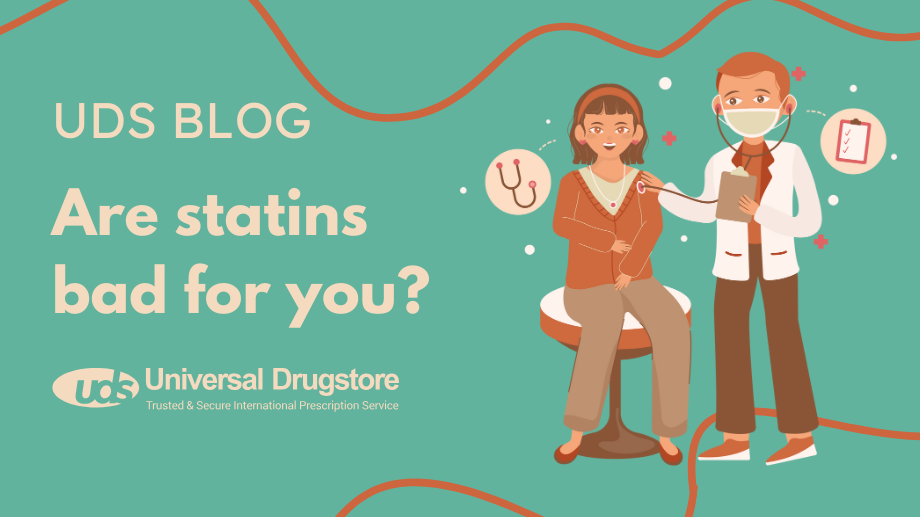Are statins bad for you?

Statins are medications that are used to help lower your cholesterol. They work by blocking a substance in your liver that your body needs to make cholesterol. Several statins are FDA-approved for use in the United States, including:
- Lipitor (atorvastatin)
- Zocor (simvastatin)
- Crestor (rosuvastatin)
- Livalo (pitavastatin)
- Pravachol (pravastatin)
- Lescol XL (fluvastatin)
- Mevacor (lovastatin)
Statins have been widely used and studied, and they are effective in reducing the risk of cardiovascular events, such as heart attacks and strokes, particularly in people with high cholesterol levels or those at risk of heart disease.
However, like any medication, statins may have side effects, and their use should be carefully considered and monitored by your healthcare provider. Common side effects of statins include muscle pain, digestive issues such as constipation, diarrhea, indigestion or gas, dizziness, and headache. Severe side effects are rare but can include liver damage and a condition called rhabdomyolysis, which involves the breakdown of muscle tissue.
It’s important to weigh the potential benefits of statin therapy in reducing your risk of heart attack and stroke against the potential risk of side effects and complications. The decision to prescribe statins should be based on your overall health, cholesterol levels, and risk factors for heart disease. If you have concerns about taking a statin or are experiencing side effects, discuss them with your healthcare provider. They may adjust your dosage, switch to a different statin, or find an alternative medication such as Zetia (ezetimibe), Nexletol (bempedoic acid), Praluent (alirocumab), or Repatha (evolocumab) to manage your cholesterol levels if necessary.
Keep reading as we discuss other important information you need to know about statins and answer some frequently asked questions.
Statin FAQs
What are statins?
Statins, which are also known as HMG CoA reductase inhibitors, are a class of medicines used to lower cholesterol. Statin drugs target a liver enzyme that regulates cholesterol production. This prevents the build-up of cholesterol in your blood vessels and arteries which helps reduce your risk of heart attack and stroke.
Some statins can decrease your low-density lipoprotein (LDL) or bad cholesterol by 50% or more. They also decrease your triglycerides while also increasing your good cholesterol (HDL) levels.
Who can take statins?
Not everyone who has cardiovascular disease will be prescribed a statin. Guidelines from the American Heart Association and American College of Cardiology recommend that these people may benefit from taking a statin:
- People who do not have heart disease, but are at a high risk of heart disease.
- People who have heart disease that is related to atherosclerosis.
- People who have very high LDL cholesterol that is not controlled by healthy lifestyle changes.
- People with an inherited health condition that causes high cholesterol levels.
What are the potential side effects of statins?
While most statins are effective and well-tolerated, they can cause some side effects. Common side effects include:
- Muscle pain or muscle aches
- Headache
- Diarrhea
- Dizziness
- Indigestion
- Constipation
- Fatigue
- Nausea
- Bloating
- Low platelet levels
- Trouble sleeping
Other possible side effects include:
- Memory loss or confusion
- High blood sugar levels
- Skin rash
- Pins and needles sensation
- Hair loss
- Erectile dysfunction or lowered sex drive
Rare but serious side effects include:
- Allergic reactions including anaphylaxis
- Liver damage
- Severe muscle damage (rhabdomyolysis)
- Complications while pregnant or breastfeeding
What drugs interact with statins?
Grapefruit juice can interfere with the enzymes that break down the statins in your liver. Ask your healthcare provider about how much grapefruit you can have.
Some medications that can interact with statins include:
- Pacerone (amiodarone)
- Lopid (gemfibrozil)
- HIV protease inhibitors like Invirase and Norvir
- Antibiotics and antifungals like Biaxin and Sporanox
- Immunosuppressants like Sandimmune (cyclosporine)
Can you stop taking statins once you start?
If you have had a heart attack or stroke and your doctor prescribes a statin, it is probably best to keep taking it. Statins can lower your chance of having another heart attack or stroke. However, if you are taking statins due to high cholesterol and have not had a heart event, stopping the medication may be an option. Always consult your doctor before stopping a statin.
What causes high cholesterol?
High cholesterol is a condition in which you have too many lipids (fats) in your blood. Causes include:
- Poor diet
- Lack of exercise
- Being overweight
- Smoking
- Drinking alcohol
- Genetics
- Medical conditions like kidney disease, HIV, diabetes, low thyroid, lupus
How do statins prevent heart attacks and stroke?
Statins reduce cholesterol levels, especially LDL cholesterol. LDL can build up in arteries and cause blockages that lead to heart attacks and strokes. Statins help prevent new buildup and stabilize existing plaques to reduce the risk of clots.
Are there any natural alternatives to statins for lowering cholesterol?
If you cannot tolerate a statin, natural alternatives include:
- Red yeast rice
- Psyllium (fiber supplement)
- Fenugreek
- Fish oil (omega-3s)
Always talk to your healthcare provider before starting an alternative treatment.
Sources
- American Heart Association
- CDC
- Mayo Clinic
- Newman, C., Preiss, D. et al. (2018). Statin Safety and Associated Adverse Events. Arterioscler Thromb Vasc Biol. 2019;39:e38-e81.


